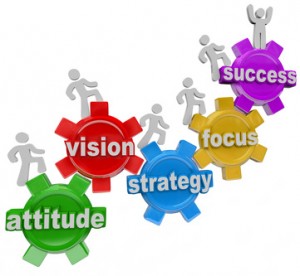It’s All About Strategy
 During the month of January, I had the opportunity to discuss the topic of job search strategy on multiple occasions. From a LinkedIn Live session, where I was the guest of a fellow coach, to a presentation to a professional organization with which I have been very active in their Career Fair for the last 5 years, to a job search support group I facilitate myself, job search strategy, and how to implement it into one’s job search is a topic which is very well received.
During the month of January, I had the opportunity to discuss the topic of job search strategy on multiple occasions. From a LinkedIn Live session, where I was the guest of a fellow coach, to a presentation to a professional organization with which I have been very active in their Career Fair for the last 5 years, to a job search support group I facilitate myself, job search strategy, and how to implement it into one’s job search is a topic which is very well received.
Often, I will hear, when beginning to work with new clients, something of the following. “I’ve applied for so many different jobs, and I have not gotten any response back. I don’t understand it. It must be my resume’. Or they must be discriminating against me because of my age. I am so frustrated, and I don’t know what to do.” This does not surprise me at all. In fact, I am more surprised when a job searcher says to me, “I applied for several jobs, all online. I did not even know anyone at the company. They all got back to me, and now I’m struggling to figure out how I’ll balance scheduling all of the interviews that they’re asking me to do.”
It has been over 10 years now when I was trained as a Certified Career Coach by the Five O’Clock Club, (now rebranded to GetFive), an outplacement and career coaching strategy firm based out of New York City. Even back in my training at that time, I learned there are 4 ways to find a job. They were directly applying, working through recruiters, networking and directly contacting those firms in which you have an interest. The success percentage in landing jobs with those 4 methods dramatically was based on the use of networking and direct contact in one’s search. How often did job searchers indicate that those two methods lead to them successfully landing a job. The answer was a whopping 80% to 90% of the time.
Combined with these 4 different ways of applying was a 5-step process, that has been the basis of my career coaching and counseling of clients over my entire time as a Career Coach. One begins with Assessment of what it is they are either looking to do, or where their skill sets will most attract perspective employers. They then begin Researching those organizations and industries that need those skills. That Research takes on two forms. One is look-up research, through publications, periodicals, online postings, etc. This is known as 2nd hand research. Complimenting it is first-hand research, by directly speaking with those in the professions, or who work at the companies of interest to you.
Assessment and Researching then leads the job searcher into Targeting. A job target consists of an industry, a job function or role and a geographic location for doing the job role. Last month, our monthly blog even pointed out how that geographic location has evolved over time from a physical location to doing a job role remotely. Initially, one may have a significant number of targets. However, as they continue their search process, the goal is for feedback to emerge that sends a message back to the job searcher as to in which targets the job searcher may be receiving the best response. Sometimes that has to do with availability of open jobs in a target at the time of their search. Other times it could be based on their demonstrated skill sets. If the searcher does not like the feedback they are receiving, they have the accountability to either modify the message, or improve their qualifications for the targets they desire pursuing.
As one becomes more focused on where they will concentrate their search, the need to Interview becomes essential. Some of those Interviews will be for job opportunities. But, others should and need to be Informational Interviews. These are ones where the interviewer is the job searcher, learning the needs of those who are hiring. One is never just hired because a hiring company feels sorry for them. There is a need to be filled, a candidate is sought, and is ultimately hired based on their ability to fill that need.
Above all, the fifth and continual final step in the job search strategy process is Follow-Up. It is an “Absolutely Essential” part of the process. Companies get busy and delay the hiring process for weeks. A candidate comes in after you that has additional qualifications that were not discussed when you did your interview. The company has a “vision” of an ideal candidate that has not emerged. One continuing to follow-up, express their interest in a role, adding information as to their qualifications, are all part of the job search strategy process.
Again, it has been 10 years since I have learned this methodology. Job search support tools come, and job search support tools go. Ways that people may offer their services also come and go. But, the essential strategy process of how one connects with those that need their services was in existence long before I learned it, has continued over the time that I have been a coach, and will continue to be as time goes on.
